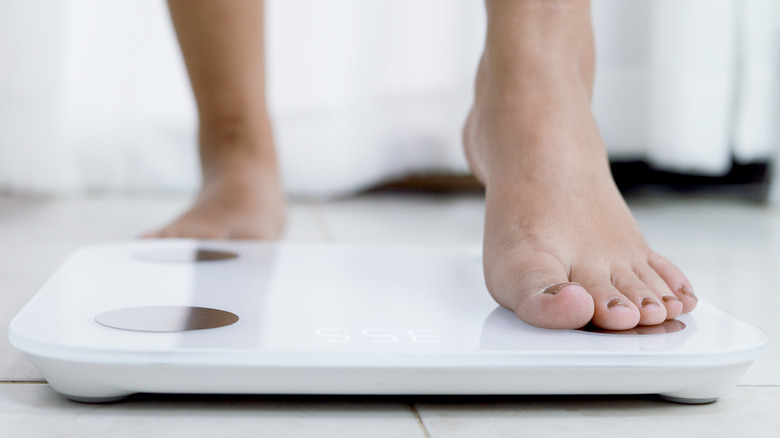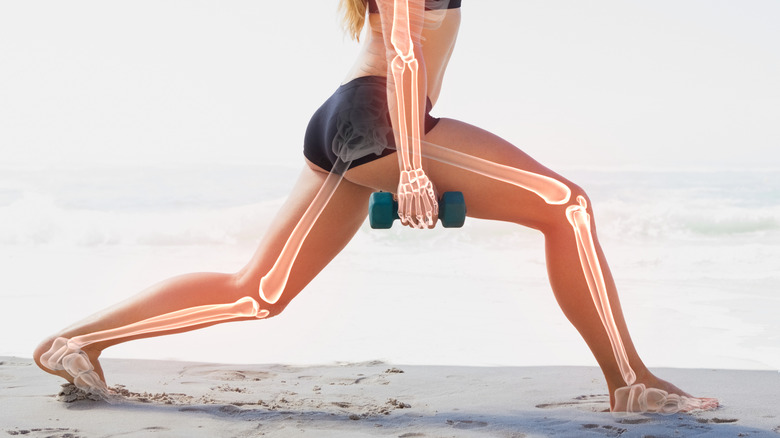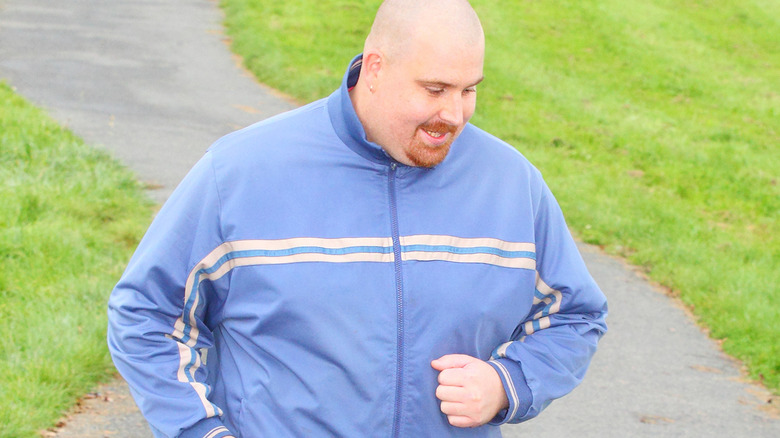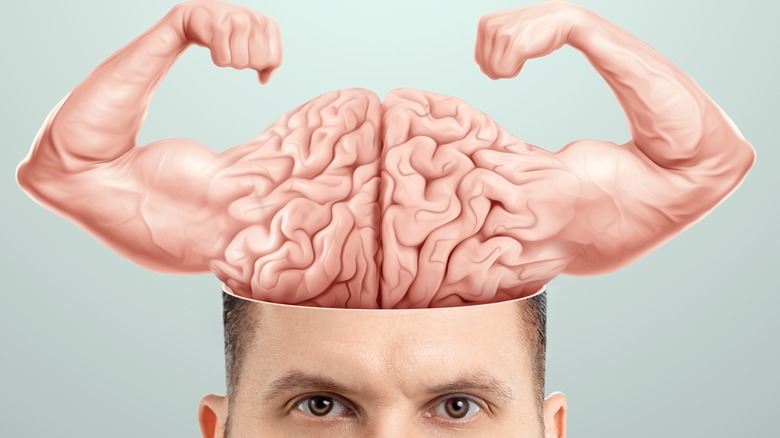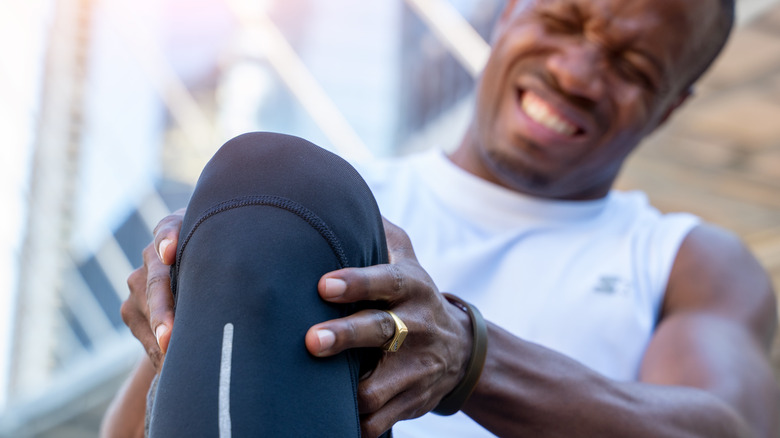What Happens To Your Body When You Run A Mile Every Day
We all have that friend who desperately tries to convince us to run a marathon with them. "They are fun," they say, as we moonwalk out of the room in retreat. Distance runners are a special breed of highly motivated people who find enjoyment in, well, long-term pain. We know many-a-marathoner whose physical health and endurance far exceed our own. We've also found it hard to ignore the sprinters racing across our TV screens during this year's Olympic games (via Runners World). Each type of race taps into a completely different skillset and tests a multitude of physical abilities.
For those of us less inclined to seek out the pain cave through anaerobic sprinting or endurance racing, know that just running a single mile every day can have some wonderful health benefits. From heart-pumping increases to weight management and more, here is what happens to your body when you run a mile every single day.
Your muscles will get stronger
Even if gaining strength is not your goal, you are likely to grow stronger muscles if you run a mile every day. According to Insider, strength increases are most readily gained when you challenge yourself during your runs. You can absolutely challenge yourself on a one-mile run by ratcheting up the pace or incorporating some hills. In fact, strength gains are built on a foundation of good nutrition and solid running.
If you are new to running and want to challenge yourself, working up to a mile every day is a great way to do so. By taking your body through movements it is unaccustomed to, you will definitely build strength. By putting your muscles under stress, which is what exercise is, they adapt by recovering stronger. You will especially notice a difference in your lower body, sports physical therapist Michael Jordan told Insider. Your glutes and your calves help propel you forward, but running also heavily relies on your hamstrings, hip flexors, and quads.
You might lose weight
Running is one of the most efficient exercises around when it comes to burning calories (via Healthline). When you run a mile every day, you increase the number of calories burned per day, which can lead to a decrease in body fat mass.
A lower amount of belly fat has been linked to a lower rate of life-threatening diseases. Some of these diseases include type 2 diabetes, heart disease, and, surprisingly, even cataracts. Less body fat can help keep your joints, especially your knees, happy and healthy even if you impose high demands upon them, explained Healthline.
Running one mile every day may even have appetite-suppressing benefits. This lesser-known side effect of aerobic activity can help with weight, too. A less aggressive appetite might mean that you're able to say no to the bag of Flamin' Hot Cheetos that you bought on a whim, and that can also help you reach your weight loss goals (if you have them).
Your stamina will improve
You can think of your capacity to perform aerobic activity like any other skill — the more you practice, the better you'll get. The main thing to remember: If you put in the work, your endurance can greatly improve (via Runners World).
From a physiological standpoint, your body's ability to intake and utilize oxygen will become more efficient. This is called your VO2 Max. As your body becomes more efficient at transporting oxygen, your ability to go farther for longer and with less effort increases, Healthline detailed.
Even if you decide that long-distance running isn't your jam, these fitness benefits are still within your reach. You can still challenge your system into adapting over one mile! By increasing your pace or sprinting up hills, your body will have no choice but to adapt. The experts at Runners World caution new runners to seek these VO2 Max gains slowly. If you implement a new running routine of 1 mile per day for a whole year, your heart and lungs will be working more efficiently by the end of the year. We'd say this happens whether you want it to or not, but it's hard to think of a reason why anyone would want to have less functional hearts and lungs!
Running will boost your mood and improve your sleep
Nearly all forms of physical activity boost your mental health. When you take the time to get sweaty every day, your body reacts by producing endorphins and serotonin (via WebMD). Both of these brain chemicals lead to feelings of well-being. But that's not all! Running can also help reduce stress and anxiety because it triggers the release of endocannabinoids. This biochemical substance is not all that unlike cannabis. When it floods your bloodstream, it can lead to short-term feelings of calmness, explained WebMD.
Consistent running has also been proven to increase the quality of your sleep. Other brain chemicals that are released after a run encourage your body into a deeper sleep. Deep, consistent, and restful sleep has been proven to increase your mental health. It's also super important for supporting brain function! WebMD also revealed that running outside can reduce your feelings of loneliness and isolation.
Your bones will get stronger
As we get older, we start to lose bone density. This is especially true for women (via Johns Hopkins). Thankfully, running is one weight-bearing aerobic exercise to help slow the loss of bone minerals. Runners World reiterates what exercise physiologists know to be true: There are a few ways to increase your bone health.
One of the best ways to increase the strength of your bones is to engage in quick, jarring movements. These types of movements stress your bones, which encourages them to get stronger, just like your muscles! It is important not to overdo high-impact movements, making running a mile every day a great choice (via Runners World). The other main way to increase bone density is to engage in weight-bearing resistance training. A combination of one mile per day and some resistance training can help keep your bones nice and strong.
Your heart will get stronger
A strong ticker is the foundation of a long and healthy life. Luckily, running one mile every day has been shown to benefit heart health and strength (via Women's Health). Your heart is a muscle, after all — and the stronger it gets, the better off you'll be. The more you run, the more efficient your body becomes at utilizing oxygen, explained Active. This translates to a lower resting heart rate and higher overall oxygen consumption. With a stronger heart pump, your body can circulate blood, which carries oxygen, more efficiently throughout the body.
Your heart responds to imposed demands much like the other muscles in your body. It will adapt and grow stronger to accommodate the demands you place on it. Running one mile every day is a great way to start stressing your heart into getting stronger. And don't worry, your body will adapt fairly quickly. If you are able to run one mile every day for a year, your heart will be very well adapted to the one-mile stressor by the year's end.
Your lungs will become more functional
We've all been there — the last one to finish an athletic event, practically on your hands on your knees, gasping for breath. Okay, so maybe Simone Biles hasn't been there, but we sure have. It's important to remember that your heart and lungs are teammates. They work in tandem to deliver oxygen throughout your body. Your lungs bring fresh oxygen into your body and filter out the gases you do not need, according to The Lung Association.
Your lungs provide your blood with fresh oxygen, delivered to your muscle cells, and acts as a type of fuel when you're working out. When you run a mile every day, your muscles start to need more oxygen. Your lungs need to work harder to provide your heart with the oxygen that can then be pumped to your muscles via your bloodstream. The stronger your lungs are, the less likely you are to be gasping for breath as you finish your daily mile (via American Lung Association).
Your digestive system might start to work better
You may have heard that runners sometimes go during serious races when there isn't time to scope out a port-a-potty. Rest assured, this is not always the case. In fact, running a mile every day has the potential to make your gastrointestinal tract healthier, no embarrassing accidents required.
One study revealed that exercise has been proven to improve the gut microbiome in just six weeks (via Healthline). However, these benefits fall by the wayside if exercise is discontinued. The researchers conducting this test found a positive increase in gut microbes that can aid in the production of short-chain fatty acids. The more short-chain fatty acids, the better, in this case. They help ward off inflammatory conditions and a host of diseases in your body.
While GI troubles may be more prominent in the world of long-distance running, you are unlikely to experience that during your daily mile (via Runners World). In fact, your gut might actually thank you for the extra little bugs!
Running helps improve body image
Many people struggle with dissatisfaction with their bodies to some extent. A statistic published by Do Something, a youth-led volunteer organization, states that 91% of women are unhappy with their bodies and resort to dieting to achieve their desired shape. These feelings are less prevalent but cannot be ignored among men either.
The Marathon Training Academy explains that the Western concept of beauty influences the world and allows our dissatisfaction to simmer. They offer three tips to increase your overall body image: Examine your focus and thought patterns, go on a media cleanse, and focus on strength. Running is a great way to focus on non-scale-related wins and strength gains. Running allows you to set new, tangible goals that have nothing to do with the shape of your body (via Marathon Training Academy). It's also pretty hard to scroll the 'gram while running, so you might as well get moving and skip the social media. Running can also increase mood and confidence, which can change the way you view your body.
If you are struggling with an eating disorder, or know someone who is, help is available. Visit the National Eating Disorders Association website or contact NEDA's Live Helpline at 1-800-931-2237. You can also receive 24/7 Crisis Support via text (send NEDA to 741-741).
You'll feel more empowered
As you age, you may find yourself set in your routine, no longer pursuing new physical adventures. Well, it's officially time to rethink the status quo. A lack of physical activity can lead to an underuse of muscles, which can turn into atrophy, joint immobility, and a lack of balance (via Medical News Today). Running one mile per day is a great way to build a base of strength, agility, and endurance (via U.S. News & World Report). Even the benefits of a single daily mile can add up. Running can leave you with a sense of control and empowerment, which can trickle into the other aspects of your life (via Finisher Magazine).
If you're an older adult who is new to running, though, you should work your way up to a mile slowly. "Build your endurance and intensity over time. Work with a trainer if you can through a senior center or gym. Or join a walking or hiking group," Justus Ortega, a kinesiologist and director of the biomechanics lab at Humboldt State University, advised in an interview with U.S. News & World Report. "If you get to a point where you feel like you want to try running, start in small increments and consult your physician before you start."
You may become more motivated
Admiral McRaven's motivational speech says it all. In his speech, McRaven uses making your bed as an example of a bite-sized yet somehow monumental task to start your day. He says that by completing one small action that you can take pride in, you will be motivated to continue completing tasks that day. If you wake up and make your bed, you create a positive feedback loop for your day.
We can apply this same logic to running. Once you complete your run, your motivation mounts. YouTuber Kyle Nutt ran for 30 minutes every day for 30 days and detailed his experience in a 2020 interview with Men's Health. "There was no denying the fact that after I completed a run, I felt very motivated for the next few hours or so, if not the whole rest of the day," he explained. "Overall, I just really liked the way I felt when I was consistently running."
Your pace will improve
We have a dirty secret to share with all of the non-runners out there: Running is hard for everyone! If a mile feels impossible to you now, trust the process and know that walking/jogging a mile every day will soon become old hat. Your body adapts, and the best thing about running is that there is always a new goal to chase! Whether you want to improve your overall pace, distance, or power output, there are tried-and-true ways to accomplish this (via Healthline).
If you run one mile every day, your body will certainly adapt over time. This means you'll develop the ability to run for longer without taking a break, or you might notice an improvement in your pace. Once your leg muscles start to understand what is expected of them, they will begin to propel you forward more quickly. Faster movement means upgraded oxygen needs, and your heart and lungs will have no choice but to follow suit, explained Healthline.
You'll decrease your cancer risk and potentially fall in love with running
Among all of the other benefits, a decreased risk of developing cancer tops our list. Running one mile per day gives you a distinct edge over non-runners. According to a 2016 study in JAMA Internal Medicine, running a mile per day equates to a 42% decrease in your chance of developing esophageal cancer, a 27% lower risk of liver cancer, and 26% reduced risk of lung cancer, among others (via Road Runners Sports).
While you're staving off your cancer risk, you are likely to fall in love with the effects of running. It can help open your life up to a community of diverse people and, if nothing else, give you something to talk about with your coworkers and friends (via Running Insight). The physical act of running might still feel hard, but we assure you that this perk far outweighs the negatives.
You'll improve your memory
Embarking on a journey of regular exercise is one of the best things you can do for your brain. According to Harvard Health Publishing, regular exercise actually physically changes your brain by encouraging the growth of new blood vessels and stimulating the chemicals that allow for brain cell growth. A scientific review published in Physiology also notes that running, specifically, increases the formation of neurons in rodents. The authors also referred to studies with evidence pointing toward exercise's ability to prevent memory loss through neurodegeneration.
Running is just one of the many exercises you can enjoy to reap these benefits. Two studies showcased in a Women's Running article noted the benefits of aerobic exercise (like running) on the brain. One study showed a notable improvement in blood flow to the brain after a six-month exercise regiment, which researchers believe consequently led to the improved executive function that participants also had. The second study found a 47% increase in memory scores when participants stuck with an aerobic exercise routine for over a year.
You might injure yourself
As good as daily running can be for the body, it can also lead to wear and tear. According to experts at Barrington Orthopedic Specialists, running can cause overuse injuries, such as plantar fascitis, shin splints, and stress fractures. Some people may be more at risk for injury than others, according to research published in Current Sports Medicine Reports. For instance, runners with subtalar pronation more commonly experienced shin splints than other runners. Shin injuries were also more common in runners with high or low arches.
However, many overuse injuries can also come from not preparing yourself properly before running or taking care of your body after running. The Better Health Channel states that training beyond your current fitness level, wearing incorrect shoes, and using a poor running style can all lead to mild or severe injuries. To keep yourself safe, start slowly and work your way up to a pace that you feel comfortable with. Also, don't skip warm-ups. Take time to stretch your thigh and calf muscles to help your body prepare for your run.
You can lower your blood pressure and cholesterol levels
The American Heart Association states that one of the top causes of high cholesterol is a lack of physical activity, in addition to unhealthy lifestyle habits and being overweight or obese. It stands to reason, then, that exercising — especially with an aerobic activity like running — could be a remedy for high cholesterol. According to the Cleveland Clinic, exercise can both decrease bad cholesterol and increase good cholesterol. That said, there's no need to run if you don't want to; even walking or jogging can do the trick, especially if you have problems with painful joints.
Daily running also has another important heart-healthy benefit: lowering blood pressure. Researchers of a study published in the Journal of the American College of Cardiology explain that as we get older, it's more common to experience aortic stiffness, which can increase blood pressure. However, the researchers found that regular training for a first-time marathon effectively improved aortic stiffness and decreased blood pressure. Researcher Charlotte Manisty explains, "Our study shows it is possible to reverse the consequences of aging on our blood vessels with real-world exercise in just six months" (via UCL News).
You could feel like you have a cold
Have you started to feel like you're getting a cold after running for a few days straight? There could be a scientific reason behind your sniffles.
Sports medicine doctor Jordan Metzl tells CNN that running is commonly associated with runny noses and sore throats. Former middle-distance runner Liam Boylan-Pett adds their experience: "Sniffles — snot rockets galore — and cough were just part of the game when it comes to winter running." These symptoms tend to be more common in colder weather, but they could happen in warm weather or even indoor running. That's because depending on how your body handles dryer air, you could experience narrowed and irritated airways. You may be able to better control these symptoms by staying adequately hydrated and breathing through your nose rather than your mouth when running (via MDVIP).
If you are going to run in the cold, do what you can to prevent actual sickness. While running in cold temperatures isn't necessarily bad for you, the Cleveland Clinic advises runners to wear layers to keep warm and stay dry after running to help your body temperature regulate itself.



